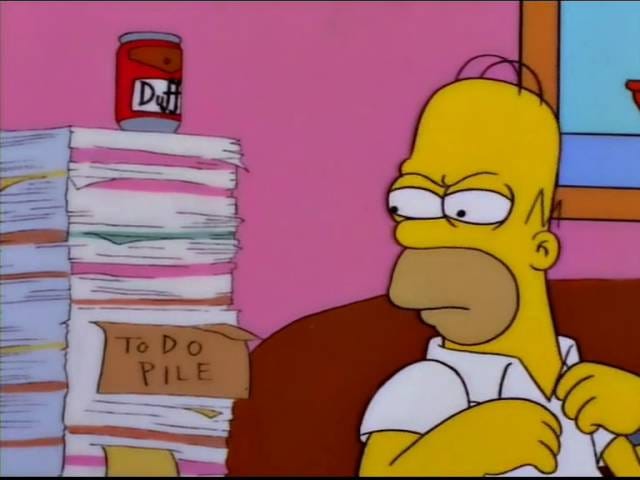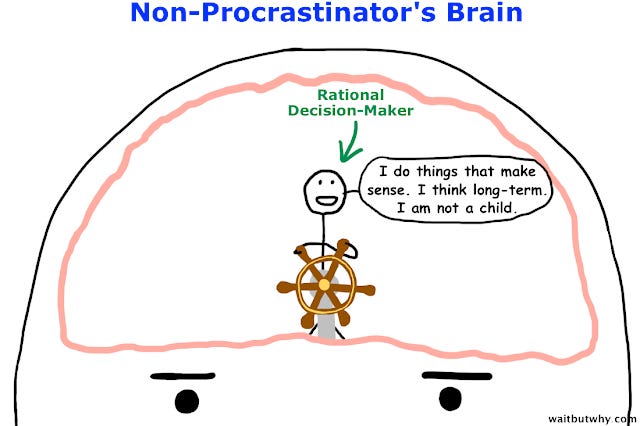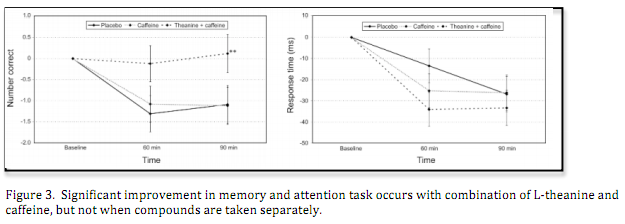How Testosterone reduces Procrastination
Studies suggest procrastination is essentially a manifestation of anxiety
The most popular TED talk on the TED Youtube channel is Tim Urban of Wait But Why’s presentation titled Inside the mind of a master procrastinator.
He basically explains that procrastination happens not because we’re irrational people, but because the “Rational Decision-Maker” gets distracted and sidetracked by the “Instant Gratification Monkey.” We know what we’re supposed to do, we know that we’ll feel so much better when that thing is done, but doing the thing is uncomfortable so the monkey very easily wins you over with some shiny new objects (behaviors). We know that doing the uncomfortable thing will be rewarding in the end, but we also know that the shiny new object will be rewarding straightaway, and is not nearly as uncomfortable to do.
How does anything ever get done then?
Tim says that’s where the panic monster comes in - when the deadline gets close enough and the reality of the repercussions of not doing the thing feel closer and more dangerous, we panic and finally do the thing. The discomfort of not doing the thing finally became far stronger than the discomfort of doing the thing and you get to action.
According to a paper called State Anxiety and Procrastination: The Moderating Role of Neuroendocrine Factors, much of the literature suggests that procrastination is essentially a manifestation of anxiety with most studies consistently finding anxiety positively correlating with procrastination. Higher levels of anxiety are associated with higher levels of procrastination.
I think this is why I find L-theanine combined with caffeine to be great for writing. Caffeine is great for obvious reasons - it basically ‘speeds up’ the system, but I’m susceptible to the slight anxiety/jitters/body tension it can effect as I increase the dose of caffeine. (I do a deep dive on the anxiety-provoking effects my video titled Does coffee make you fat and anxious? ) L-theanine’s main effect is helping you relax without making you drowsy (likely via raising GABA), and many have found it effective for tamping down the slight anxiety that caffeine can provoke. Studies have found it to improve mood and focus. Research has found better memory and attention in people who combined L-theanine with caffeine rather than taking caffeine alone.
Further there is evidence that L-theanine lowers trait anxiety.
When you think of compounds that help you be more productive, you probably think of stimulants like ritalin or adderall that basically make you really alert. However, it’s a lot easier for me to do the fluid thinking necessary for creative work when I’m relaxed. I often procrastinate on my writing if I’m too tensed up. On some micro level, it feels like there is more instances of unconfident mental activity if I feel slightly more anxious. Ideas will come but they will quickly be vetoed by unconfident mental blips saying “they’re not gonna find that interesting, don’t write that.” With less anxious blips appearing in my mental space, the overall feeling is a more confident, more carefree “just write it and let’s see how it looks, you can edit it later.” This allows ideas to flow much more easily and I get way more done just trying things out rather than vetoing every sub-perfect idea. That is, with less anxiety, the writing process is more comfortable; less painful. There’s less friction to it; there’s less resistance.
Note: It’s hard to express these slight increases or decreases in anxiety - I’m not trying to oversell L-theanine. If 100 is a full blown panic attack, then the amount of anxiety I experience when sitting down to write is say a mild 8 and L-theanine brings this down to a slightly better 7.
So what does this have to do with testosterone?
Keep reading with a 7-day free trial
Subscribe to Joseph Everett’s WIL Newsletter to keep reading this post and get 7 days of free access to the full post archives.








